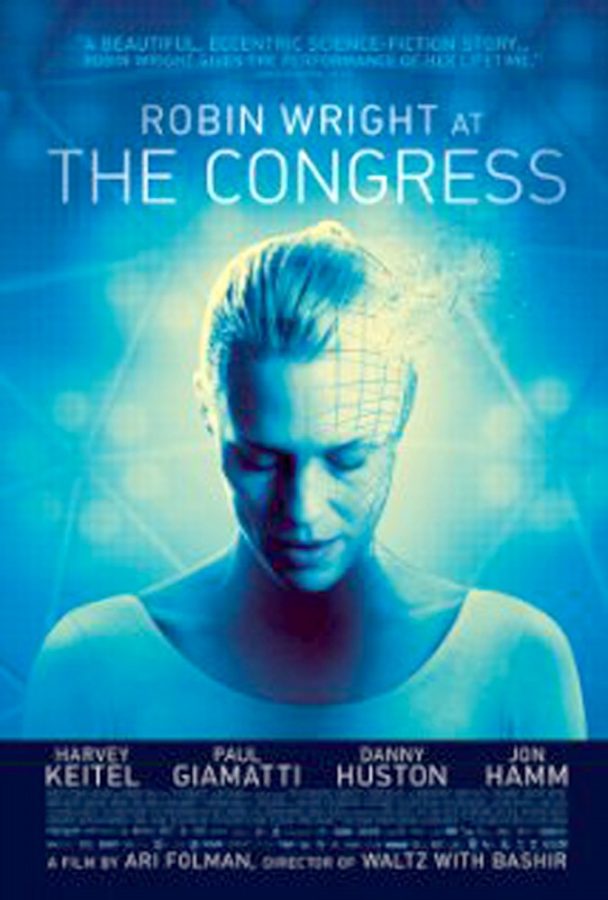Actors are the most important tools in movie making, treated with a reverence and humanity above that of any other position on set. Once a film starts shooting, everyone, including the director, can still be fired, except for the actors. However, director Ari Folman imagines a world where actors are not tools, but digital templates.
A hybrid of live-action and animation, “The Congress,” partially based on Stanislaw Lem’s 1971 novel “The Futurological Congress,” overextends beyond the enticing premise of its first act.
Robin Wright plays a fictional version of herself, although this version is of an aging actress who’s being phased out by the studios. This could be farther from reality, with Wright presently manipulating the country as cool Claire Underwood in “House of Cards.”
Perhaps “phased out” isn’t the correct phrase. In an obvious reflection of the current post-production and green screen-laden film industry, Wright the actress is being phased out, but Wright the character is in high demand.
The head of Miramount Studios (Miramax and Paramount put together) presents Wright with one final contract: Allow the studio to use a digital copy of her in movies, and don’t act for 20 years. The tech has advanced so that movies can be made without breathing performers, but with their electronic avatars.
With the studio head all but guaranteeing obsolescence if she doesn’t go along with it, and with the added prospect of spending more time with her son Aaron (Kodi Smit-McPhee) who’s steadily going both blind and deaf, Wright opts to be scanned.
Wearing a white bodysuit that masks everything but her face, Wright must present emotions on cue to be scanned by the impressive dome of lights and cameras that surrounds her. The blue flashes burst to capture her likeness, illuminating her face in an alien, skeletal way.
When she refuses to continue with the process, her agent (Harvey Keitel) tells her a story that takes her from laughing to crying, all so that the necessary emotions are on file. It feels like a violation, a theft, of Wright’s soul.
Given the state of film in the year 2014, this presentation of the entertainment industry is uncomfortably prescient. You don’t need to look farther back than “The Maze Runner,” released not two weeks ago. What allowed director Wes Ball to take the reigns was 2011’s “Ruin,” his eight-minute long action short that was entirely special effects work. “The Maze Runner” has already grossed $150 million dollars against its $34 million budget and a sequel is in the works.
If there’s writing on the wall, it says, “We’ll do it in post.”
Folman, however, expands his vision beyond that of the film industry, and this is where “The Congress” derails, almost to never get back on track.
After 20 years of no acting, Wright goes to the Futurological Congress, Miramount’s new tech showcase. She must sniff a hallucinogenic before entering, and the world transforms into a cartoon that explodes with vivacity.
Using the phrase very deliberately, this is Miramount’s “Brave New World.” This also is where the film lost me. The studio has cracked DNA, chemistry and free will; in the cartoon universe, people can transform into anyone or anything and don’t have to face the pain and suffering of “the other side.”
The second act takes the notions introduced in the first and takes them to their furthest extent, going off the edge. It’s a blue pill too big to swallow.
The animations are a gorgeous fever dream, but this potent image potpourri becomes overpowering and ludicrous.
After cartoon Robin and her cartoon partner have sex that saw their naked, foliage-sprouting bodies framed against an exploding blimp, they are served lobster by a grinning Michael Jackson.
Remember all of the ethical questions raised by the Tupac Shakur hologram at Coachella in 2012? In this future, you can be Tupac. Or Jesus Christ. Well, for some, that’s one and the same.
However, the sobering third act brings us back to the other side and offers a final minute that is beautiful and nearly transcendent, but it’s not enough.
“The Congress” opens and closes strongly, but its middle is too much of a mess.
Grade: C
_______________
Follow Alex Guyton on Twitter @GuyTonAlexAnder









